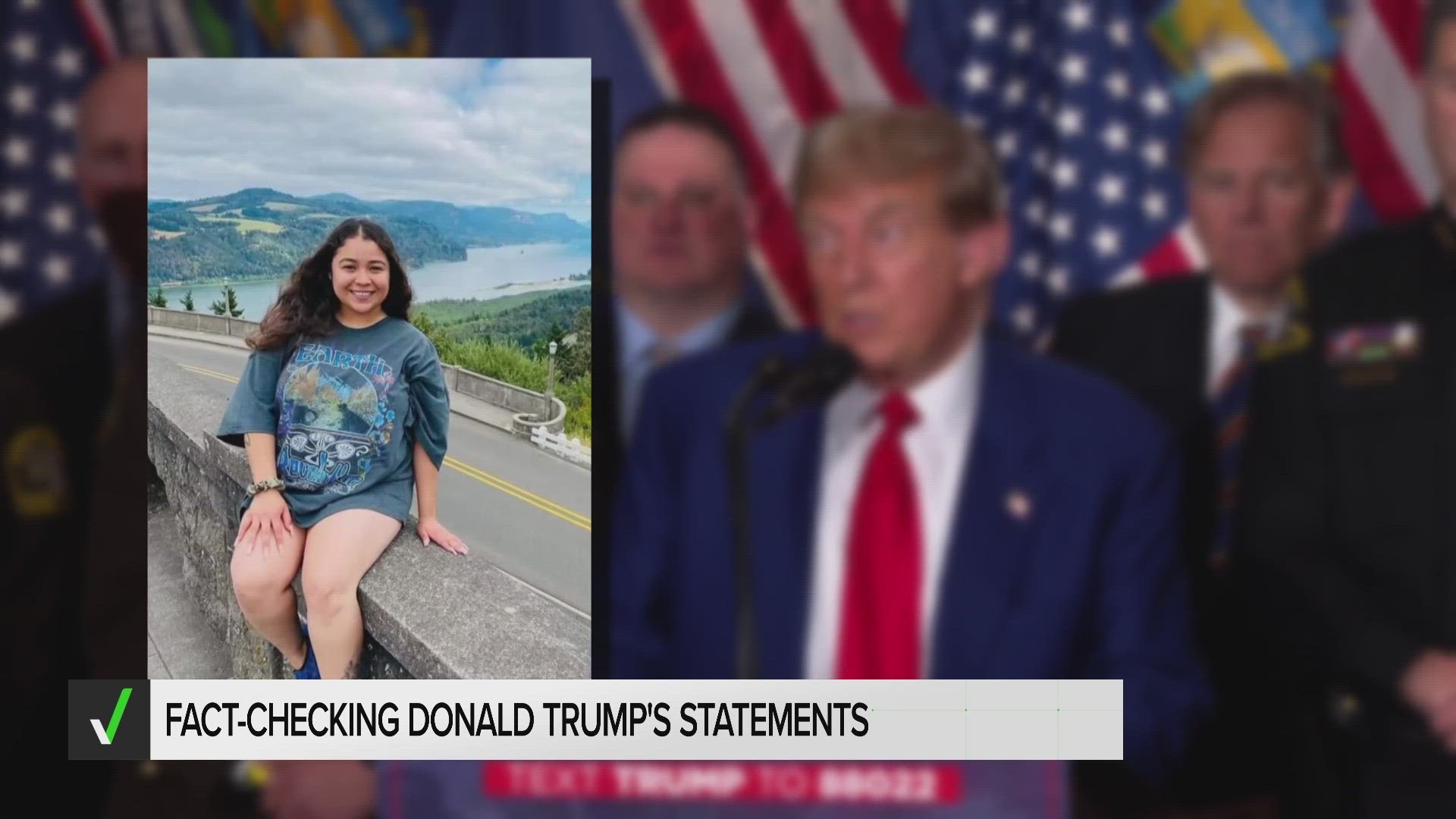GRAND RAPIDS, Michigan — Former President Donald Trump traveled to Grand Rapids on Tuesday to address voters and local Republican officials.
Speaking at DeVos Place downtown, he honed in on the issue of immigration and the U.S. border and shared what he feels is a contrast between his vision and what he sees as the failed policies of President Joe Biden.
He made a number of claims, some of which need context.
THE CLAIM
The former president claimed in his speech that he had spoken with the family of Ruby Garcia, the 25-year-old Grand Rapids woman who was found dead on US-131 on March 22. Her death gained national attention when Brandon Ortiz-Vite, her alleged killer, was confirmed to have entered the country illegally.
WHAT WE FOUND
This claim has now been disputed by Garcia's immediate family.
Garcia's sister told 13 ON YOUR SIDE that the former president had not spoken with her family in the run-up to his visit.
"I can confirm and assure you he did not speak with me or my immediate family," she later told ABC News as well.
THE CLAIM
Trump claimed that fentanyl and opioid deaths in Michigan are up 32%.
WHAT WE FOUND
This claim about the 32% needs some context.
While Trump seemingly framed this as current data, saying that these deaths "are" up 32%, the latest year-over-year data we received from the state doesn't reflect this.
According to the Michigan Department of Health and Human Services, finalized Michigan Resident Death data provided to 13 ON YOUR SIDE shows that from 2016 to 2022, the only time that deaths in which synthetic opioids (including fentanyl) were present in the cause of death were at that percentage among Michigan residents was in a 32.2% increase from 2019 to 2020, when Trump was president.
The only time they exceeded this was in a 50.4% year-over-year increase from 2016 to 2017.
Between 2020 and 2021, a 19.7% increase was listed. Between 2021 and 2022, a 2.6% decrease was listed.
Data on the MDHHS website also labels year-over-year synthetic opioid deaths that occurred in the state from 2016 to 2022. These changes each fell within 1% of the changes observed among Michigan resident deaths, meaning Trump's claim only matched the 2019-2020 levels in both accountings.
Additionally, deaths involving heroin, another type of opioid, have decreased each year in Michigan since 2017.
THE CLAIM
The former president claimed that Gov. Gretchen Whitmer is offering $500 per month to residents to house immigrants who entered the U.S. illegally.
WHAT WE FOUND
The Newcomer Rental Subsidy from the Michigan Department of Labor and Economic Opportunity's Office of Global Michigan, which is the program giving landlords money to help with new immigrants' rent, is only open to refugees and immigrants here under certain statuses.
In order to benefit from this, according to Global Michigan, someone would need to be renting and fall into one of these statuses:
- Refugees
- Asylees
- Special Immigration Visas
- Victims of Human Trafficking
- Cuban or Haitian Entrants
- Afghan Nationals
- Ukrainian Humanitarian Parolees
Other non-refugee statuses that may be considered, according to Global Michigan, include the following:
- Those under the Cuban, Haitian, Nicaraguan and Venezuelan (CHNV) program
- Those under the Family Reunification Parole Process for El Salvador, Guatemala, Honduras, and Colombia
- Those with a pending asylum application
- Other immigrant individuals on a case-by-case scenario
As this lists lays out, other immigrants are considered on a case-by-case basis.
Immigrants and refugees who apply do need to present legal documents that confirm their eligible status. This means that applicants need to be actively going through a legal immigration process.
State officials confirmed to 13 ON YOUR SIDE in the days following Trump's comments that the program only works with individuals who are in the country lawfully.
However, they noted that the office does not involve itself with a person's status establishment, which happens at the federal level of immigration.
Given that U.S. law allows someone to apply for asylum up to one year after arriving in most circumstances, including when the individual initially entered the country illegally, this suggests a possibility that someone who entered illegally and later applied for asylum might qualify for the program.
Editor's note: This story has been updated to include comment from state officials that returned 13 ON YOUR SIDE's request for comment following the publishing of the original article.
Additional editor's note: 13 ON YOUR SIDE fact-checks both candidates as we head closer to election day in November. You can see a list of Verify stories below:
►Make it easy to keep up to date with more stories like this. Download the 13 ON YOUR SIDE app now.
Have a news tip? Email news@13onyourside.com, visit our Facebook page or Twitter. Subscribe to our YouTube channel.
Watch 13 ON YOUR SIDE for free on Roku, Amazon Fire TV Stick, Apple TV and on your phone.

